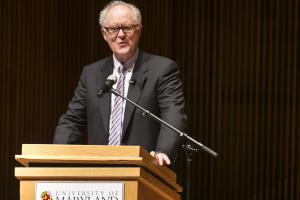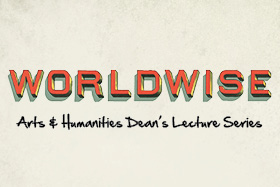"Arial","sans-serif"">For Immediate Release, November 19, 2013
COLLEGE PARK, Md. – A crowd of over 600 people filled the Dekelboum Concert Hall last night to hear actor and children’s author John Lithgow, who appeared as part of the University of Maryland College of Arts and Humanities Worldwise Arts & Humanities Dean’s Lecture Series.
Known to millions as everything from a “Dirty Rotten Scoundrel” to a visiting alien, Lithgow charmed the audience with his erudite humor and his wisdom, drawing on his distinguished stage and screen career as well as his longtime commitment to American education.
In a conversation with Sheri Parks, UMD associate professor of American studies and former NPR host, Lithgow entertained the audience with a lighthearted and spirited defense of the arts and humanities.
“The humanities and arts are an indispensable part of a child’s education and development,” said Lithgow. “In an era where STEM subjects and test prep dominate the educational diet, it is essential students be provided their minimum daily allowance of this key source of nourishment and enrichment.”
Lithgow, the author of numerous children’s books, is also a member of the American Academy of Arts & Sciences Commission on the Humanities and Social Sciences. As such, he encouraged the audience to join him in “seconding the motion” whenever the value of the arts and humanities is discussed.
The reason he said is “simple and inarguable: a society, or a nation, or a world that embraces the arts and humanities is a much better one.”
The commission’s report, “The Heart of the Matter,” released in June, has since sparked conversations across the country about the myriad reasons the humanities are vital to the future of our nation. Lithgow’s appearance at UMD added even more voices to the discussion.
Another component of the Dean's Lecture Series involves speakers interacting with students and faculty in smaller settings. Earlier in the day, Lithgow conducted a master class with UMD theatre students—a unique opportunity for them to learn from an Emmy and Tony Award winner.
“It was huge to have a seasoned professional come in and say they are doing the same work as you,” said Shane O’Loughlin, senior theatre major in the School of Theatre, Dance, and Performance Studies. “As artists we’re always creating, questioning and doubting if our work is right or good enough.”

Photos courtesy of John Consoli.
Class is in session with John Lithgow and students from UMD’s Theatre 425: The Actor’s Process II.
About the University of Maryland College of Arts and Humanities
The College of Arts and Humanities at the University of Maryland is home to over 4,500 undergraduate and graduate students, 14 academic departments, five independent research centers, and over 322 tenured and tenure-track faculty. The arts and humanities at the university cover the cultures of the world, past and present, in all their rich variety. Through teaching and research that investigates human experience, thought, expression and creativity, the college aims to educate global citizens who assess received opinion, make independent judgments, and value the transforming power of the imagination. The college is leading the way in interdisciplinary approaches to the arts and humanities by developing emerging fields like digital humanities, and offering area study programs that draw on multiple fields to open exciting, multifaceted views of such regions of the world as Latin America, the Middle East and East Asia.








